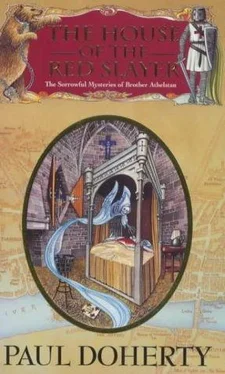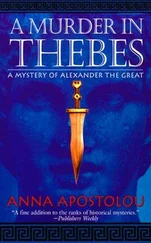Paul Doherty - House of the Red Slayer
Здесь есть возможность читать онлайн «Paul Doherty - House of the Red Slayer» весь текст электронной книги совершенно бесплатно (целиком полную версию без сокращений). В некоторых случаях можно слушать аудио, скачать через торрент в формате fb2 и присутствует краткое содержание. Жанр: Исторический детектив, на английском языке. Описание произведения, (предисловие) а так же отзывы посетителей доступны на портале библиотеки ЛибКат.
- Название:House of the Red Slayer
- Автор:
- Жанр:
- Год:неизвестен
- ISBN:нет данных
- Рейтинг книги:5 / 5. Голосов: 1
-
Избранное:Добавить в избранное
- Отзывы:
-
Ваша оценка:
- 100
- 1
- 2
- 3
- 4
- 5
House of the Red Slayer: краткое содержание, описание и аннотация
Предлагаем к чтению аннотацию, описание, краткое содержание или предисловие (зависит от того, что написал сам автор книги «House of the Red Slayer»). Если вы не нашли необходимую информацию о книге — напишите в комментариях, мы постараемся отыскать её.
House of the Red Slayer — читать онлайн бесплатно полную книгу (весь текст) целиком
Ниже представлен текст книги, разбитый по страницам. Система сохранения места последней прочитанной страницы, позволяет с удобством читать онлайн бесплатно книгу «House of the Red Slayer», без необходимости каждый раз заново искать на чём Вы остановились. Поставьте закладку, и сможете в любой момент перейти на страницу, на которой закончили чтение.
Интервал:
Закладка:
‘What happens,’ he asked the darkness, ‘if Sir Ralph has been killed by secret peasant leaders? And if the revolt comes…?’
He dozed for an hour until a warm, furry body slid under his hand, ‘Good evening, Bonaventura!’ he whispered.
‘A cold day for a gentleman of leisure.’
He sat up and stroked the cat gently, scratching between the backs of its ears, making Bonaventura purr with pleasure. ‘So, you have been visiting all your ladies in the neighbourhood?’ Athelstan knew about Bonaventure’s sexual prowess. Sometimes the cat even brought his ‘ladies’ back to the church steps to sing their own eerie vespers to a cold silver moon. ‘What will happen, Bonaventura, when the rebellion comes? Will we side with Pike the ditcher and the other dispossessed?’
Bonaventura grinned in a fine display of pink gums and sharp ivory teeth. Pike the ditcher! Strange, Athelstan thought, but there it was. He had no proof but he was certain the ditcher was a member of the Great Community and carried secret messages to its leaders. Athelstan tensed as the church door opened.
‘Brother Athelstan? Brother Athelstan?’
The friar smiled. Benedicta. Perhaps she would share his supper? They could exchange gossip about the parish; anything to distract his mind. He put Bonaventura down, stood, and broadened his smile, to hide his disappointment. Beside Benedicta stood a tall man, his features quite clear in the torchlight. His face was burnt dark by the sun, his raven-black hair tied in a knot at the back of his head. He was dressed in a long blue robe which reached down to snow-flecked boots. Athelstan went along the nave to meet him. The man was strikingly good-looking, he thought, with the sharp features of a hunting peregrine, vivid cherry-brown eyes, a hooked nose and neatly clipped moustache and beard. Athelstan saw the pearl pendant which hung on a gold chain from one ear lobe.
‘This is Doctor Vincentius,’ Benedicta exclaimed.
Athelstan clasped a strong, brown hand. ‘Good evening, sir. I have heard of you.’
And who hadn’t? Athelstan wondered. The physician lived in Duckets Lane off Windmill Street, on the other side of the Tabard Inn. He had recently bought a huge house there with a garden which bordered on the river, directly opposite Botolph’s Wharf. Vincentius had won himself a name as a reputable physician. His fees were petty and he didn’t bleed his patients with leeches or use strange zodiac charts and stupid incantations. Instead he preferred to emphasise cleanliness, the importance of a sensible diet, the efficacy of boiled water, and the need to keep wounds clean. Cecily the courtesan had even intimated that he used an ointment which was most effective in curing certain sores on the most delicate parts of the body. Athelstan studied the extraordinarily handsome face and the beaming smile on Benedicta’s. The friar felt a twinge of jealousy.
‘I have heard of you, Father,’ the doctor smiled.
Athelstan shrugged. ‘I am a priest, a friar, one among thousands.’
The doctor spread his hands and the rings on his fingers sparkled. ‘But there again, it is written on many tombstones… “I was a healthy man until I met a physician”.’
Athelstan laughed, immediately liking the man. ‘I don’t see you in church,’ he teased.
‘Perhaps one day, Father.’
‘Doctor Vincentius so wanted to meet you.’ Benedicta spoke as coyly as a young girl. ‘I wonder, Father, if you could join us for supper?’
Athelstan felt like refusing, but that would have been churlish. He clapped his hands briskly. ‘I would love to.’ He doused the lights in the church and locked the door, leaving Bonaventure to hunt in the darkness. He went across to the house whilst Benedicta and her strange visitor waited on the church steps. Philomel was still munching noisily on his oats. Athelstan patted him gently, took his cloak from the house and rejoined Benedicta and Vincentius.
They walked through the silent, icy streets into Flete Lane, near Holyrood Walk, where the widow lived. This was the first time Athelstan had been to Benedicta’s house, a two-storied building which stood alone, an alleyway on either side and a garden beyond. On the ground floor was a huge kitchen, parlour and store room. The kitchen had no rushes on the floor but the flagstones were scrubbed and wiped clean. Two box-chairs were pushed near the roaring log fire. Above the hearth ran a broad oaken shelf containing silver and pewter cups which shimmered by the light of two multi-branched candelabra; woollen rugs of dark murrey hung against the white-washed walls. A warm, homely place, Athelstan thought. Indeed, very much as he had imagined it. They both helped Benedicta prepare and serve the meal. First jussell, composed of eggs and spiced bread. Then succulent hare cooked in wine, a jelly moulded in the form of a castle, and a jug of chilled white wine and claret which Cranston would have downed in a trice.
Vincentius quietly dominated the conversation. Athelstan found his courtly manners and soft, well-modulated voice fascinating. Perhaps Vincentius realised he talked too much and, changing the conversation, asked about the friar’s day. Athelstan described his journey to the Tower and Sir Ralph Whitton’s death.
‘He will not be missed,’ Vincentius observed. ‘A dour, war-like man.’
‘You met him?’
The physician smiled. ‘I know of him, though it’s the Tower I find more interesting. I went there yesterday. A wonderful testimony to the subtlety of the human mind, especially when it comes to engines and places of war.’ Vincentius sipped from his goblet. ‘You say Sir Ralph’s throat was slashed?’
‘Yes,’ Athelstan replied. ‘Why?’
‘How was the body when it was found?’
‘What do you mean?’
‘Was it cold? Was the blood congealed?’
‘Yes, it was,’ Athelstan replied, though he remembered he had not asked that question himself at the time. ‘Where are you from, Doctor?’ he deftly turned the conversation. The physician carefully put his wine cup back on the table.
‘I was born in Greece, of Frankish parents. They later returned to England. I studied at Cambridge, then Santiago and Salerno.’ He grinned. ‘At Salerno,’ he continued, ‘I spent most of my time trying to forget what I had learnt at Cambridge. The Arabs have a more thorough grasp of medicine than we. They know more about the human body and have proper Greek translations of Galen’s Art of Medicine and Hippocrates’ Book of Symptoms.’
‘What brought you back to Southwark?’ Benedicta asked.
The physician smiled as if relishing some private jest.
‘Why not?’ he joked. ‘Wealth? I have enough. And as you know, Brother, the poor need any help they can get.’ He leaned across the table and studied Athelstan’s face carefully.
‘What are you going to recommend, Physician?’ Athelstan teased. ‘The eagle’s remedy for bad eyesight?’
‘What’s that?’ Benedicta asked.
‘Brother Athelstan jokes,’ Vincentius replied. ‘The charlatans say the eagle gets its keen eyesight by eating raw lettuce. So they claim rubbing the eyes with the juice of the lettuce will clear up any eye infection.’
‘And will it?’
‘A bag of nonsense!’ Vincentius snapped. ‘Warm water and a clean cloth will do more! No, Brother,’ he tapped Athelstan lightly on the fingers, ‘what you need is more sleep. And if you have any lettuce, eat it. It will do you good.’
Athelstan laughed. ‘If I can find it! The frost has killed everything in my garden, and Ursula’s pig scoffs the rest.’
Whilst Benedicta described Ursula and her malevolent sow, Athelstan felt tempted to talk to Vincentius about the desecration of the cemetery but concluded it was not a topic suitable for the table. He looked across at the hour candle and saw it was growing late. He rose and made his farewells, politely refusing Benedicta’s invitation to stay longer. He had enjoyed the meal but was glad to be gone, reminding himself that he was a priest and Benedicta was the mistress of her own life. He left her house and trudged wearily through the snow. The night was cold and black but when he stopped and looked up between the black overhanging gables of the houses, he was pleased to see the clouds beginning to break up. He would have gone straight home but made a short diversion when he found Pike the ditcher drunk as a bishop on the corner of the trackway leading down to the church. Athelstan helped his errant parishioner to his feet
Читать дальшеИнтервал:
Закладка:
Похожие книги на «House of the Red Slayer»
Представляем Вашему вниманию похожие книги на «House of the Red Slayer» списком для выбора. Мы отобрали схожую по названию и смыслу литературу в надежде предоставить читателям больше вариантов отыскать новые, интересные, ещё непрочитанные произведения.
Обсуждение, отзывы о книге «House of the Red Slayer» и просто собственные мнения читателей. Оставьте ваши комментарии, напишите, что Вы думаете о произведении, его смысле или главных героях. Укажите что конкретно понравилось, а что нет, и почему Вы так считаете.












